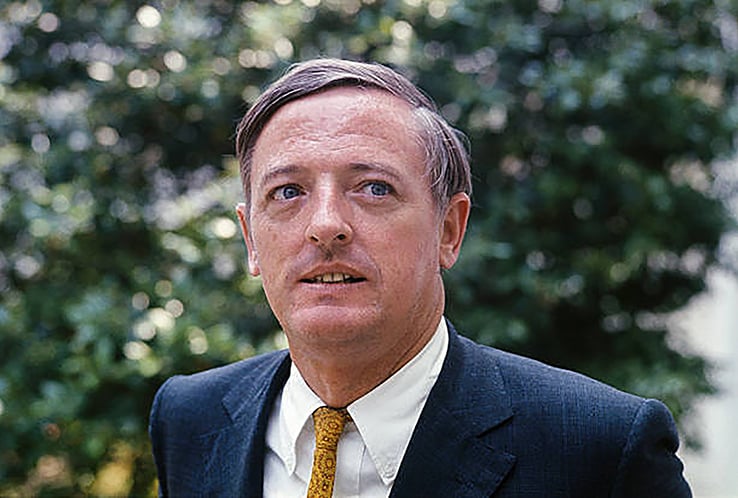Last week, PBS aired The Incomparable Mr. Buckley, a documentary on William F. Buckley, Jr. The film, directed and produced by Barak Goodman, is part of PBS’ American Masters series, and it is—as anyone might have predicted—a work rooted in the leftism of its makers. It offers a caricature rather than a full portrait of a learned man who had an impact not just on conservatism but the American culture as a whole.
More than that, it is a mediocre production that looks rather like a series of chronological events drawn from the Wikipedia entry on Buckley. Any interior life of Buckley is erased and Goodman spends more time on Gore Vidal’s sleazy goading of the man into the famous “queer/crypto-Nazi” confrontation during their 1968 debates than on, say, Buckley’s wife, Patricia, who appears in this shamble of a documentary to be little more than a cipher or an accidental wife.
Yet even in this milquetoast takedown of Buckley, the real target is unmistakable: Donald J. Trump. At the end, and very clumsily, Goodman somehow insists on drawing a straight line between Buckley to Trump, with footage from the Jan. 6, 2021 “insurrection,” standing in as evidence with which to assault the viewer with the indelible impression that these are two very bad men. It’s silly and incredibly dull.
Naturally, the left misunderstands Buckley, whether willfully or not. Conservatives have offered many commentaries about the documentary, but the tone of the film served to put many of them on the defensive, which is, unfortunately, an often-used tactic of the left playing into an all-too-common conservative temptation. Many of their objections to the film were valid but inevitably, much of what was offered in response to the attack ended up sounding more like worship of Buckley than meaningful biographical assessment.
William F. Buckley, Jr. is unrepeatable, both from the standpoint of history and his own uniqueness as a person. Any real assessment of Buckley can only happen from a distance, in a place where he is treated as a biographical subject.
An additional thing many conservatives appear to miss about Buckley’s life and thought is that his conservatism was grounded in philosophy, not in a “movement.” To be sure, he galvanized people, and the culmination of his life’s work, in a way, can be said to be the presidency of Ronald Reagan. But the core of Buckley’s conservatism was grounded in metaphysics, a dispositional conservatism described and espoused by British philosopher, Michael Oakeshott.
In his 1956 essay, “On Being Conservative,” Oakeshott wrote, “My theme is not a creed or a doctrine, but a disposition. To be conservative is to be disposed to think and behave in certain manners; it is to prefer certain kinds of conduct and certain conditions of human circumstances to others; it is to be disposed to make certain kinds of choices.” Oakeshott connected politics to philosophy, and this is essential in our understanding of Buckley as well. Although he would definitely not have called himself a philosopher in the academic sense, Buckley’s speeches and conversations with others (especially on his television show, Firing Line) revealed an ordered mind that thought in metaphysical categories.
Oakeshott writes that “… to be conservative is not merely to be averse from change … it is also a manner of accommodating ourselves to changes … for change is a threat to identity, and every change is an emblem of extinction … changes, then, have to be suffered; and a man of conservative temperament (that is, one strong disposed to preserve his identity) cannot be indifferent to them.”
Buckley certainly wasn’t indifferent. He pushed back, “standing athwart history, yelling Stop!” The “history” Buckley was pushing against is understood in terms of Marxism and extreme rationalism (another important element in Oakeshott’s thinking). Buckley understood himself to be resisting the society that has no perennial foundation, that embraces innovations that create nothing but in fact destroy the human spirit.
In a 1970 Playboy interview, Buckley commented on the human need to constantly change and the perils of rationalism—changing life fundamentally for the sake of change itself. Referencing Oakeshott (something Buckley had done in many of his weekly columns), he said, “Oakeshott has made the demonstration once and for all that rationalism in politics—which may be defined as trying to make politics as the crow flies—is the kind of thing that leads almost always and almost necessarily to tyranny.”
Buckley was not conserving conservatism (something many conservatives appear to be trying to do these days). He was reminding people of the already established definitions of what it means to be human. He wasn’t in the least interested in any -ism but in a way of life that acknowledged the existence of God, and affirmed a reality that man is not the measure of all things.
Today, many conservatives have not internalized the primacy of metaphysics in politics, which is why they are stuck in defending an -ism, and reducing Buckley’s thought to another form of ideology. The question, of course, is whether conservatism is already doomed at the outset precisely because it is a disposition and not an ideology? In understanding Buckley, it is difficult to imagine that he understood himself to be intentionally starting a “movement.” It is more like he accepted his responsibility to use his gifts to defend the American principles of order and life.

Leave a Reply